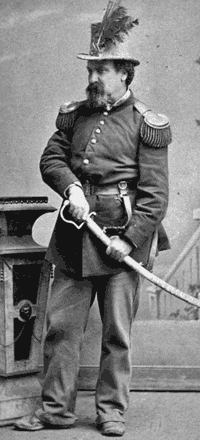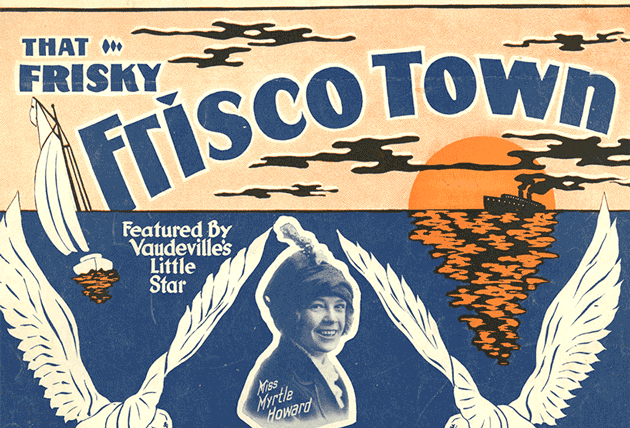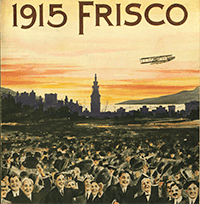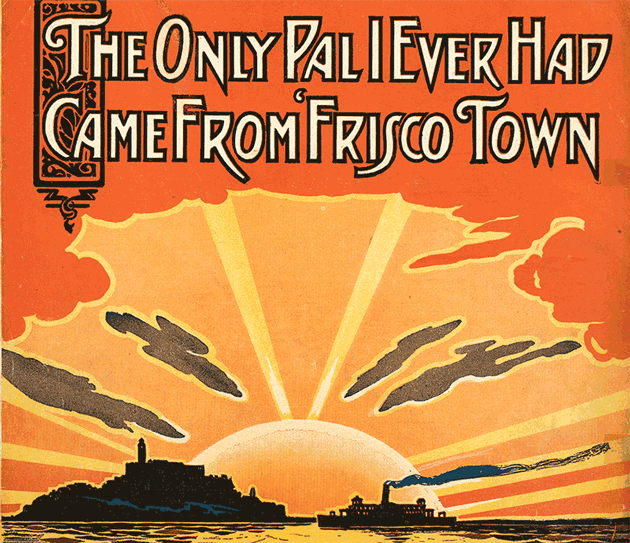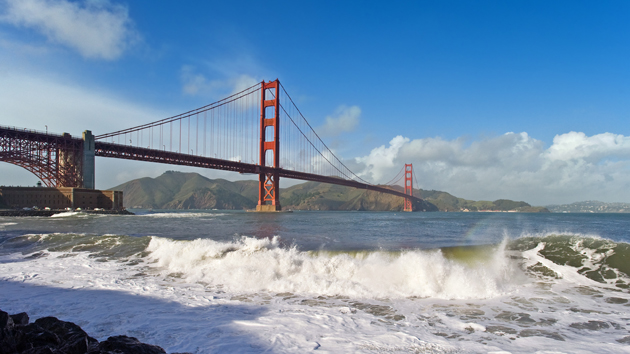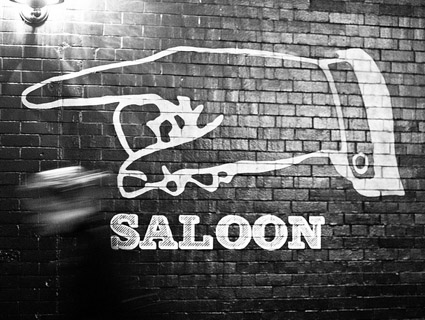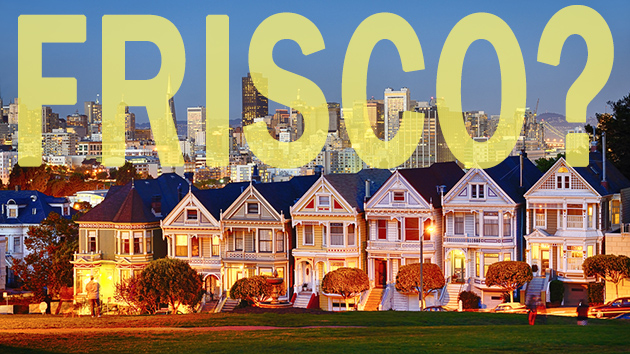
<a href="http://www.shutterstock.com/pic-122041915/stock-photo-the-painted-ladies-of-san-francisco-california-sit-glowing-amid-the-backdrop-of-a-sunset-and.html?src=csl_recent_image-2">ventdusud</a>/Shutterstock
When they’re not arguing about lettuce in burritos or their love-hate relationship with tech, San Franciscans are duking it out over “Frisco”—the 165-year-old nickname for The City that inspires a remarkable amount of vehemence. For many years, “Don’t call it ‘Frisco'” was a kind of shibboleth for SF natives. But a backlash to anti-“Frisco” hegemony has been growing, culminating with today’s Buzzfeed-sponsored Call It Frisco Day. In the interests of teaching the controversy, here’s a timeline that will provide plenty of ammo for partisans on both sides of the “F word” debate.
| Late 1840s: |
The earliest recorded uses of “Frisco” in writing. Folk etymologist Peter Tamony theorized that this syncope was in widespread use during the Gold Rush, having originated as “an Americanization of ‘El Fresco,’ the name of Mexican gold seekers for the ‘refreshing, cool’ city to which miners sojourned after long, hot months in the Sierra foothills.” (Though he also speculated that it’s related to the Old English term frip-socn, meaning “refuge of peace.”) |
| 1872 | Beloved local eccentric/crank Emperor Joshua Norton I bans use of the word “Frisco.” Or not: See below. |
| The Emperor strikes back |
Emperor Norton supposedly declared “Frisco” off-limits with this 1872 decree: “Whoever after due and proper warning shall be heard to utter the abominable word ‘Frisco,’ which has no linguistic or other warrant, shall be deemed guilty of a High Misdemeanor, and shall pay into the Imperial Treasury as penalty the sum of twenty-five dollars.” |
| 1877 |
The Dictionary of Americanisms says that “Frisco” is used “throughout California.” |
| 1882 |
The “feverish campaign against ‘Frisco'” can be traced back to this year, according to lexicographer Allen Walker Read. |
| 1895 |
The New York Sun relates a humorous anecdote about a San Franciscan with a complaint: “Easterners call my city out of its name with malicious purpose, and that none of them have been hanged for it shows that we are forbearing people beyond all others. They call my city”—the speaker choked at the word—”they call it ‘Frisco!’…Ding ’em sir, they seem to think they are doing something pleasant and smart; yet every San Franciscan loathes, with a murderous loathing, to hear his city so called.” |
| 1904 |
“No, we don’t call it Frisco, that’s tenderfoot talk,” states an old-timer in an article in The Reader. |
| 1906 |
“Anyone who goes about the country asserting that his home is in ‘Frisco’ may at once be set down as an imposter,” says The Advance. |
| 1908 |
“There never was and never will be a ‘Frisco,'” asserts the San Francisco Call: “Neither before the fire nor since has this shabby abbreviation, born of vulgarity and laziness, ever been tolerated in this neighborhood. Of course, the name is applied in a merely heedless spirit; but to the ears of the true San Franciscan it is offensive.” |
| 1912 |
The federal government decides not to refer to the city by “the flippant ‘Frisco'” anymore: “The term ‘Frisco’ as a name for San Francisco, employed by nonresidents, is objected to by a majority of the citizens of San Francisco and is never used by them. The term has been condemned by the press and civic organizations…” • The Arizona Republican ascribes “Frisco” to telegraph operators and traveling salesmen who condensed “a pretty long name for one who is in a hurry.” (It also claims that Los Angeles is known by the shorthand “Loss.”) • The San Francisco Chronicle editorializes, “There is only one San Francisco in the country, and to call it ‘Frisco’ is not only erroneous, but substitutes a rather ordinary name for a very beautiful one.” |
| 1913 |
Poet Berton Braley takes to verse to question San Franciscans’ aversion to the term: Why not call her “Frisco?” |
| 1915 |
California Outlook reports: “The influx of eastern visitors who have ‘come to see the ‘Frisco exposition’ is causing the native San Franciscan to boil with wrath.” • The same year, a traveler to the city confirms that he was warned “time and again not to refer to it as ”Frisco.'” |
| 1920 |
“San Francisco is all puffed up with itself,” declares the editor of Reedy’s Mirror. (What’s new?) Also: “Worse than saying ‘Earthquake’ is to call the city ‘Frisco.’ The word invites physical assault.” |
| 1938 |
A resident observes, “I think we are comfortably informal—although we do insist on the full name San Francisco rather than Frisco.” • An almanac published by the Federal Writers Project offers this advice for tourists: If you want to be liked in San Francisco, |
| 1943 |
Time reports: “Because ‘Frisco’ is a contraction abhorrent to all San Franciscans, roly-poly Mayor Angelo Rossi sped to Hollywood to take issue with 20th Century-Fox, about to release a picture called Hello, Frisco.” Rossi reportedly convinces the movie’s producers to promote it as Hello, San Francisco, Hello within city limits. |
| 1946 |
“If you want to win friends and influence people there, don’t call it Frisco,” a guide to California advises visitors to the city. |
| Herb and legend |
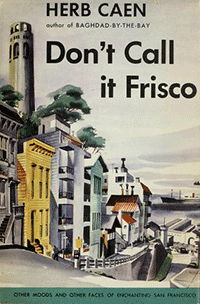 Legendary San Francisco columnist Herb Caen had an odd relationship with “Frisco.” In 1941, he insisted that “It makes you feel good all over once in a while to say ‘Frisco’ right out loud.” Then in 1953 he wrote a book called Don’t Call it Frisco. He flipped-flopped a lot. In 1993, the three-dot scribe praised “the F word” as “a salty nickname, redolent of the days when we had a bustling waterfront.” Yet in another column that year, Caen observed, “I no longer hear people say either ‘Frisco’ or, in automatic reproof, ‘Don’t call it Frisco.’ An ominous sign…” But then: “Adolescence is believing that ‘Frisco’ is a racy nickname for a city; senility is automatically saying ‘Don’t call it Frisco’; maturity is figuring it doesn’t matter all that much…” |
| 1954 |
Hells Angels Frisco motorcycle club opens. They seem like nice guys. (A knowledgeable source informs me that the club picked “Frisco” because it fit better on the rocker patches on the back of its leather jackets.) |
| 1956 |
Future San Francisco Chronicle scribe Stanton Delaplane explains to delegates coming to the city for the GOP Convention, “You can call Los Angeles ‘L.A.’ You can call chicago ‘Chi.’ But if you call San Francisco ‘Frisco,’ they cut your Republican buttons off and drum you out of town.” |
| 1957 |
“We wished each other luck,” writes overrated khaki-wearer Jack Kerouac in On the Road, “We would meet in Frisco.” |
| 1967 |
A headline in Life magazine that mentions “Frisco” draws angry letters. Cynthia Woo demands, “What made you think you could get away with ‘Frisco’…? No San Franciscan uses or likes the name.“ |
| 1968 |
“I left my home in Georgia / Headed for the Frisco Bay,” sings Otis Redding in “(Sittin’ On) The Dock of the Bay.” You can’t argue with Otis Redding. |
| 1974 |
Visiting journalists receive an official city press kit titled “Don’t Call It ‘Frisco’.” (The visitors’ bureau still issues this advice.) |
| 1977 |
Bette Midler plays Bimbo’s: “They told me, ‘Don’t call it Frisco, don’t call it Frisco… It’ll upset the natives.’ Well, FRISCO, FRISCO, FRISCO!” The Los Angeles Times reports that the audience loved it. |
| 1981 |
A mock trial is held for the F-word. Despite pro-“Frisco” testimony from Peter Tamony, the judge rules against the syncope, arguing that it demeans the city’s namesake, St. Francis. (The same judge later heard a moot case on whether there is any there in Oakland.) |
| 1989 |
Herb Caen observes San Franciscans backsliding: “Two hallowed precepts of my childhood—that you never call it Frisco and that you always call the 1906 earthquake ‘The Fire’—seem to have become outmoded. It is now accepted that Frisco suffered a quake in Ought Six…” |
| 1995 |
Caen covers his bases again: “It’s San Francisco…Not Frisco but San Francisco. Caress each Spanish syllable, salute our Italian saint. Don’t say Frisco and don’t say San-Fran-Cis-Co. That’s the way Easterners, like Larry King, pronounce it.” He also notes that reminding people to not call it Frisco is “a conditioned reflex that is wearing out.” |
| 2014 |
Writing about the proud use of “Frisco” by black San Franciscans, the SF Weekly‘s Joe Eskenazi writes that “the only people driven to complain about ‘Frisco’ appear to be aging Caucasians.” |
| 2015 |
Nearly 80 percent of respondents to the second semiannual unscientific Blue Angels survey say that it is not okay to say “Frisco.” |
| 2016 |
A digital media company valued at $1.5 billion encourages San Franciscans to “reclaim ‘Frisco'” to honor “the vital blue collar core of our city” and because it “pisses off tech bros.” |


